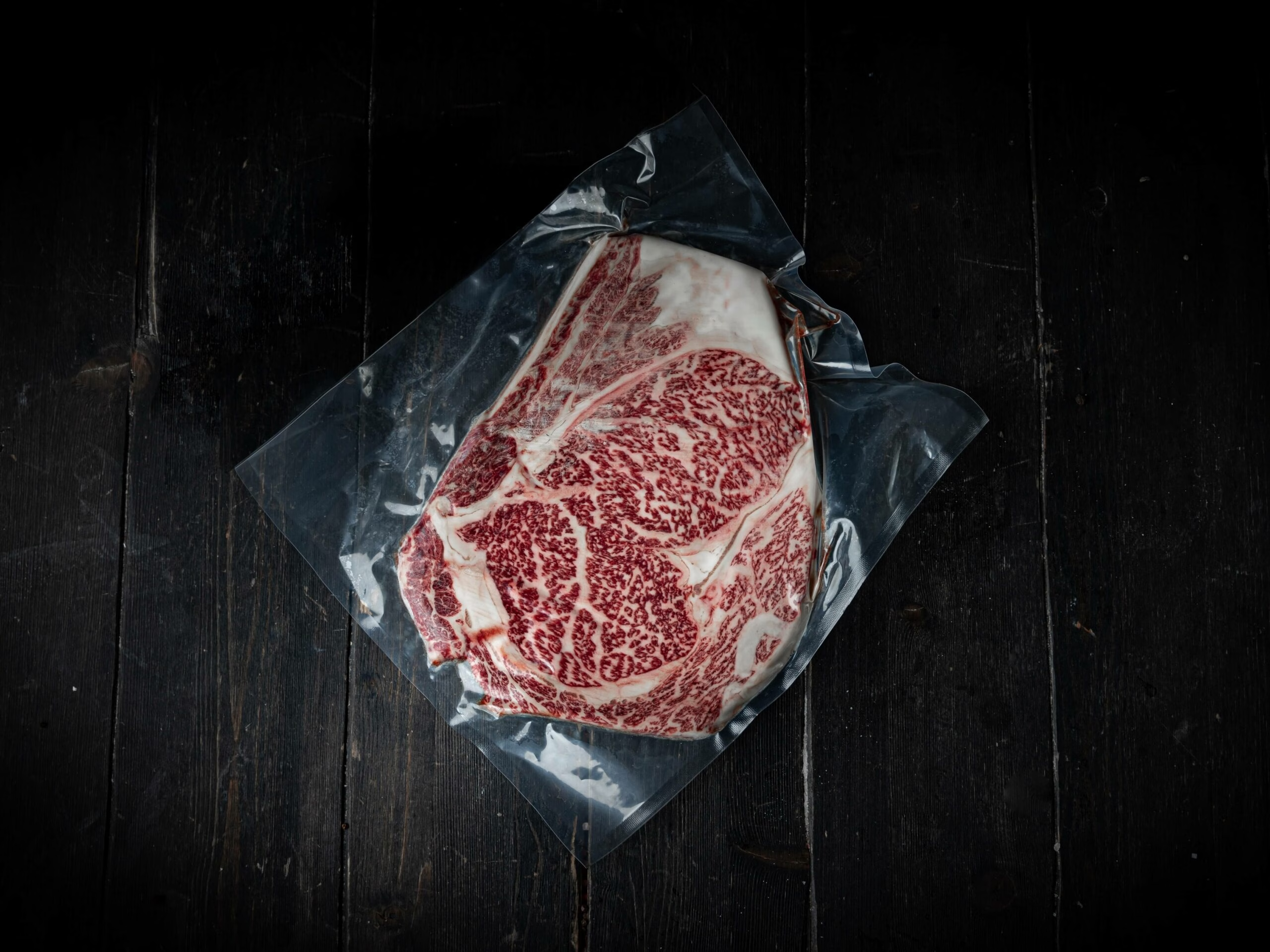Wagyu Beef is known as the most flavorful beef in the world. It only comes from a few specific strains of cows from Japan, and due to its high level of quality, the price is higher than other types of beef. Wagyu were originally draft animals utilized in agriculture but were selected due to having high physical endurance. This favored the animals with more intra-muscular fat cells, which results in its popular marbling, one of the major contributors to the meat’s unique flavor.
If you happen to buy Wagyu beef for your home and have some leftovers or even bought it in bulk, you might be wondering how to store it. This guide has everything you need to know about handling and storing your Wagyu beef to preserve its great taste and premium quality.
Understanding Wagyu
There is evidence of genetic separation into the Wagyu genetic strain as far back as 35,000 years ago. Modern Wagyu are a result of crossing native Japanese cattle with other imported breeds, which started in 1868. However, there are three major black strains – Tajiri or Tajima, Fujiyoshi (Shimane), and Kedaka (Tottori). These have continued to be bred, while there are also two red strains Kochi and Kumamoto.
In Japan, there are four breeds of Wagyu:
- Japanese Black
- Japanese Brown (also known as Red Wagyu)
- Japanese Polled
- Japanese Shorthorn
The production of Wagyu beef in Japan is highly regulated, and only the best genetics are kept for breeding. Living Wagyu may not be exported, and are considered a “national living treasure”.
How Do You Get Full Blood Wagyu Outside of Japan?
At Holy Wagyu, in order to produce full blood Wagyu cattle, the cattle are either bred naturally with our full blood herd or produced via embryo transfer via our recipient cow herd. Through our embryo transfer program, we are able to build up our herd with specific traits in mind all with the goal of providing the best user experience. They also must be fed particular diets that include various grains, forages, and minerals. This along with proper wagyu genetics gives our full blood Wagyu beef its characteristic taste and texture that has made it so popular around the world.
We believe that breeding full blood Wagyu will provide a better eating experience. We utilize our various full blood Wagyu genetic lines that were brought to the US and Australia from Japan in the early nineties to create the best full blood wagyu eating experience from our American raised Wagyu farm.
Why is Wagyu Beef More Expensive?
In addition to its premium quality, Wagyu beef is also more expensive due to the intensive process of breeding, feeding, and raising cattle for meat – it can take up to three-four years before they are ready for harvest, compared to the 12-18 months it takes for other breeds.
Due to its higher price and great taste, it’s common for people to want to store their Wagyu beef to enjoy it later. It’s imperative that you understand the proper way to handle and store Wagyu to preserve the qualities that make it better than other types of meat.
Wagyu Beef Handling and Storage
Whether you found a deal on Wagyu, or you are ready to enjoy it as soon as it arrives, there are specific ways to properly handle your beef as well as store it to preserve its tender qualities.
If you plan to eat your Wagyu in the next couple of days, then it can be stored in the refrigerator. Ensure that the packaging is airtight before you store it. Then you should make sure it is placed in the coldest part of the fridge. Typically, you should place raw meat on the bottom shelf which helps prevent contamination with other foods.
Freezing Wagyu
Contrary to popular opinion, due to its higher marbled fat content, you can effectively freeze Wagyu beef. It is in fact, one of the best meats to freeze. The fat ensures that the quality of the meat is not affected by freezing, which often happens with other types of meat.
If you are not ready to eat your Wagyu within the next two days, then it can be stored in the freezer for less than a month. There are however a few things you can do to keep your meat fresh while in the freezer:
- Ensure you are using airtight packaging.
- Consider placing it in a resealable plastic bag or airtight container.
- It’s best to store your beef on the bottom shelf (the coldest part of your freezer)
Thawing Wagyu
What might surprise you is that once in the freezer, Wagyu can stay fresh for up to 12 months. According to the United States Department of Agriculture, “frozen foods remain safe indefinitely” in the freezer. This means even if you leave the Wagyu for longer than 12 months, it should still be safe to eat. The only thing you may notice is a change in taste.
However, it is safe to say that if you can, you should consume your frozen Wagyu beef sooner rather than later. It may even be too tempting to hold wagyu in your freezer for that long.
Once you decide to thaw the wagyu, you will want to do so over 48 hours. This should be done in the refrigerator, so as not to do so too quickly. This is important so that the meat will retain all of its natural juices.
- Thaw slowly
- Take out of the freezer and place in the refrigerator in an airtight package
- Never use a microwave or hot water to thaw your Wagyu beef
Cutting Wagyu Properly
When handling your Wagyu, you need to ensure that you are cutting it correctly. Before cutting Wagyu, let it sit at room temperature for at least one hour. This should be done before any type of cutting or cooking.
A5 Japanese Wagyu steaks are almost always cut thinner than you would with traditional American beef. Sometimes it is even cut into thin slices or cubes. When it comes to Australian or American Wagyu, you might use a thicker cut for grilling or roasting, but generally, it is done thin.
How To Tell If Wagyu is Spoiled
Packaging is important when it comes to food consumption. However, when you freeze wagyu it can elongate the date usually printed on a package. In some situations, although it is safe for human consumption, if it is in the freezer for too long it may not be the best taste due to being a bit older.
Therefore, when you consider frozen food, it is more important to look into other aspects of the food to see if it is spoiled. For example, when it comes to Wagyu beef there are a few things to look out for:
- Slimy surface: If you notice that your Wagyu steak has a slight slimy surface, it may be spoiled. This will develop into something that could be clear or slightly yellow. It will make the steak seem shinier than usual. After the surface develops, mold will begin to grow.
- Discoloration: Another sign that your meat is spoiled is if the steak is a different color. Usually, Wagyu should be red and white. If it looks more brown, yellow, or green, you should not eat it. It may only be in one location as well, but any area is a sign of being spoiled.
- Smell: The smell of spoiled beef is usually pretty obvious, and spoiled wagyu is no different. The smell of a spoiled steak is usually off and will be very potent.
- Dry: Your steak should not be dry. Wagyu is known for being more tender and juicy than other steaks as well. If you touch it and it seems dry, the meat might be old and spoiled.
In general, while it can be effectively stored, we do suggest cooking your Wagyu as soon as possible to help avoid the above concerns and so you can get started enjoying its delicious taste.
How to Store Wagyu Beef
As mentioned above, if you have ordered Wagyu it is best to consume it right away. If this is not possible, and you plan to eat it in more than 48 hours, you should follow these tips. If you do so, then you will most likely be able to enjoy flavorful beef after properly storing it in the freezer, and thawing it accordingly.
Premium American Wagyu Beef Delivered to Your Door
To make sure you are only serving the best quality meal, Holy Wagyu offers American Wagyu beef that is tastier, healthier, and more satisfying than the rest. As a top meat supplier, our premium beef is monitored from farm to table and delivered fresh to your door. We source our beef from local ranchers that raise Wagyu cattle the old-fashioned way without hormones, additives, or antibiotics so you can rest easy knowing you’re preparing or storing the quality beef you and your friends deserve.


